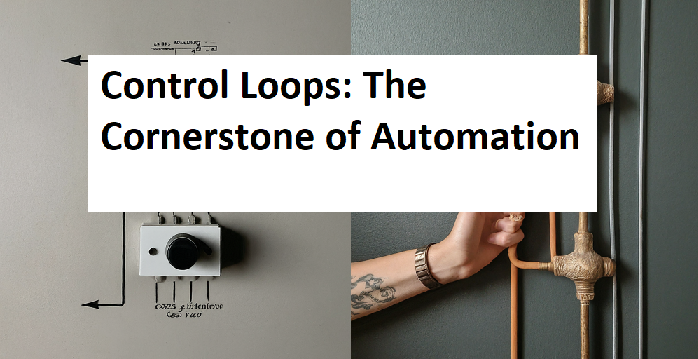Control Loops: The Cornerstone of Automation – Control loops are the fundamental building blocks of automation systems. They form the core of processes that require precise regulation and control. A control loop is a closed-loop system that uses feedback to maintain a desired output variable at a specific setpoint.

Components of a Control Loop
- Process: The system to be controlled, such as a temperature-controlled oven, a flow-regulated valve, or a robotic arm.
- Sensor: A device that measures the process variable, such as a thermometer, flow meter, or position sensor.
- Controller: A device that compares the measured process variable to the setpoint and generates a control signal.
- Actuator: A device that takes the control signal and modifies the process variable, such as a heating element, valve, or motor.
Types of Control Loops
- Proportional (P) Control: The control signal is proportional to the error between the setpoint and the process variable. This type of control provides a quick response but may result in steady-state error.
- Integral (I) Control: The control signal is proportional to the integral of the error over time. This type of control eliminates steady-state error but may lead to overshoot and oscillation.
- Derivative (D) Control: The control signal is proportional to the rate of change of the error. This type of control can anticipate changes in the process variable and reduce overshoot and oscillation.
- Proportional-Integral-Derivative (PID) Control: A combination of P, I, and D control, providing a balance between responsiveness and stability.
Tuning Control Loops
Tuning a control loop involves adjusting the P, I, and D parameters to achieve the desired performance. Several methods are commonly used, including:
- Zeigler-Nichols tuning: A method that involves gradually increasing the proportional gain until the system starts to oscillate and then adjusting the integral and derivative terms.
- Cohen-Coon tuning: A method that uses a model of the process to determine the optimal tuning parameters.
- Trial and error: A method that involves manually adjusting the parameters until the desired performance is achieved.
Applications of Control Loops
Control loops are widely used in various industries, including:
- Process control: Regulating temperature, pressure, flow, and level in chemical plants, refineries, and power plants.
- Manufacturing: Controlling machine tools, robots, and assembly lines.
- Building automation: Controlling HVAC systems, lighting, and security systems.
- Automotive systems: Regulating engine performance, transmission, and braking.
- Robotics: Controlling the movement and actions of robots.
Advanced Control Strategies
- Predictive control: Using a model of the process to predict future behavior and adjust the control signal accordingly.
- Model-based control: Using a mathematical model of the process to design the controller.
- Adaptive control: Automatically adjusting the control parameters to compensate for changes in the process.
Challenges in Control Loop Design
- Nonlinearity: Many processes are nonlinear, making it difficult to design effective control loops.
- Disturbances: External factors can disrupt the process and make it difficult to maintain the desired setpoint.
- Measurement noise: Noise in the sensor measurements can degrade the performance of the control loop.
- Time delays: Time delays in the process can make it difficult to achieve stable control.
Future Trends in Control Loops
- Artificial intelligence: AI can be used to optimize control loop performance and adapt to changing conditions.
- Internet of Things (IoT): IoT devices can be used to collect data and improve control loop performance.
- Cloud-based control: Control loops can be implemented in the cloud, enabling remote monitoring and control.
In conclusion, control loops are essential for achieving precise and reliable control of processes. By understanding the different types of control loops, tuning methods, and applications, engineers can design and implement effective automation systems that meet the needs of various industries. As technology continues to advance, control loops will likely play an even more critical role in shaping the future of automation.
Home | Join us on Facebook, Twitter, YouTube, Instagram, Quora, Reddit, LinkedIn, Pintereset, Blogger.